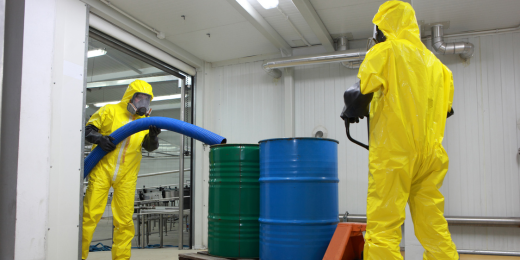The 45-Second Trick For Reclaim Waste
The 45-Second Trick For Reclaim Waste
Blog Article
Some Known Details About Reclaim Waste
Table of ContentsThe 8-Second Trick For Reclaim Waste7 Easy Facts About Reclaim Waste ExplainedThe Reclaim Waste StatementsThings about Reclaim WasteHow Reclaim Waste can Save You Time, Stress, and Money.All about Reclaim Waste

Never ever put hazardous compounds down sinks, commodes or stormwater drains pipes Materials including petroleum, grease, oil, chemicals and herbicides, and solvents such as paint strippers should not be poured down sinks, toilets or stormwater drains. These substances are hard to remove in the sewer treatment process and trigger pollution problems in our regional rivers.

Although liquid waste is a term that covers a wide range of materials, there's an excellent reason leaving its disposal to the professionals is advised. Liquid waste is non-solid product that has no more use and has to be treated and gotten rid of according to regional, state and government laws.
Fascination About Reclaim Waste
Examples of liquid waste can include wastewater, fats, oils or grease, made use of oil, fluids, solids, gases or sludges and unsafe home liquids, there are some that are thought about to be much more unsafe than others when it comes to the environment and the health and wellness of animals and human beings alike. It's for this factor that each state and territory have stringent policies linked to liquid waste administration.
Fluid waste can be stored in holding tanks or packaged in drums, intermediate bulk containers or approved small containers before either being dealt with or gotten rid of via outsourced vacuum trucks. Provided the nature of the materials, fluid waste can not go in the general waste stream and there are stringent policies on how to deal with it correctly.
(https://allmyfaves.com/reclaimwaste1?tab=Reclaim%20Waste)Depending on a decision of the level of danger, it might be necessary to remediate those websites. On top of that, unsafe fluid chemical wastes are regulated waste and should be tracked according to the state waste regulations. Under the chain of custody and duties, owners are responsible and responsible for waste generated by a company.
One of the core applications for superabsorbent polymers (SAPs) is fluid waste solidification. liquid waste removal. SAPs are used by waste management professionals to stop potentially dangerous liquids from going into waterways, groundwater aquifers, and other delicate atmospheres. Because fluids can rapidly deliver pollutants right into ecological receptors and potentially add to geotechnical failures, fluid wastes are usually prohibited from disposal in landfills
A Biased View of Reclaim Waste
Essentially, free fluids are fluids that divide from the strong section of waste material. Fluid waste can consist of the following: HDD mud and cuttings Garbage dump leachate Wastewater treatment sludge & biosolids Dug up sediments Oil and gas drill cuttings Clearing up pond filth Hydro Excavation slurry Coal combustion residuals/ash Container base sludge Concrete grinding/polishing slurry Related Article: For a useful instance of free liquids separating from waste product, take into consideration the adhering to circumstance: A waste monitoring specialist loads a dump truck with sludge from a wastewater treatment plant's oygenation container, during a regular upkeep event.
When the driver gets here at the land fill, he notifications water leaching from the sludge and pouring from the dump vehicle. The load was declined by the land fill and the vehicle driver was compelled to get rid of the waste as a fluid waste at a special facility, which raised the disposal fees significantly.
We here are the findings likewise need to be accountable for the correct disposal of our waste materials. It is not enough that we pay waste disposal business to take treatment of our rubbish.
Reclaim Waste Things To Know Before You Get This

Segregating your waste can begin inside the home. Set apart dry and fluid waste as well as edible waste, eco-friendly and non-biodegradable products.
You can utilize old trash can, pail, garden pot or old plastic drums. Drill 4 to 5 holes in the container so the air can flow. Layer the bottom with soil to absorb the damp waste. Beginning the composting procedure. Layer the garden compost with wet and completely dry waste as well as soil to preserve a balance between the damp and the dry.
Not known Facts About Reclaim Waste
Cover the compost container. As soon as a week, include dirt on top of the garden compost. To help with faster decay, you can additionally include semi composted soil to the garden compost. Keep the garden compost. If you observe the scent is becoming too solid, add extra newspapers and paper waste or add even more holes to the compost bin to keep the balance of the waste materials.
We additionally need to be responsible for the appropriate disposal of our waste materials. It is not sufficient that we pay waste disposal companies to take care of our rubbish.
Our waste, our obligation. Have you ever before questioned what takes place to your liquid waste after it's collected? Did you know that liquid waste can be recycled?
Not known Incorrect Statements About Reclaim Waste
Segregating your waste can begin inside the home. Segregate dry and fluid waste as well as edible waste, naturally degradable and non-biodegradable materials.
You can utilize old garbage can, container, yard pot or old plastic drums. Pierce 4 to five openings in the container so the air can flow. Layer the base with soil to soak up the wet waste. Start the composting procedure. Layer the garden compost with damp and completely dry waste along with dirt to preserve an equilibrium between the wet and the dry.
Cover the garden compost bin. Once a week, add dirt on top of the compost. To facilitate faster decomposition, you can likewise include semi composted soil to the compost. Keep the compost. If you observe the smell is becoming also solid, add added papers and paper waste or include more openings to the garden compost container to maintain the equilibrium of the waste products.
Report this page